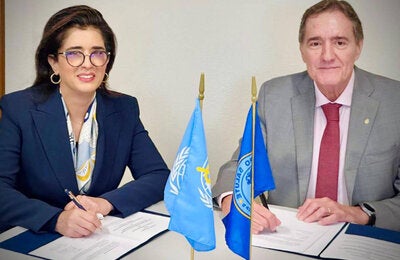
Washington, D.C., 12 April 2012 (PAHO/WHO) — Aging populations in the Americas and around the world are creating major challenges for health systems, economies, and entire societies. Meeting these challenges will require new investments in health and social protection systems but also a re-evaluation of the role of older adults in society and the economy, said experts at a World Health Day panel on "healthy aging," sponsored by the Pan American Health Organization/World Health Organization (PAHO/WHO).
"In the Region of the Americas, during the next decade more than half of those born will live beyond 80 years," said PAHO Director Dr. Mirta Roses Periago. "Healthy aging can help us break the stereotype that older people are passive consumers of social and health services. If they remain healthy and independent, they are an invaluable resource for society and can contribute enormously to the well-being of their families and communities."
The number of older adults in the Americas is expected to reach 200 million by 2020, nearly twice the figure for 2006. More than half of them will be in Latin America and the Caribbean. By 2025, 69 percent of people born in North America and 50 percent of those born in Latin America are expected to live beyond 80.
These trends are the result of major public health successes over the past century. But with them come higher costs associated with aging, including an increase in noncommunicable diseases such as heart disease, cancer, and diabetes, as well as in disabilities and other age-related conditions. In developing countries, where population aging is occurring most rapidly, coping with these demographic and epidemiological changes can be especially challenging.
Experts said that promoting "healthy aging" can help countries meet the challenges by maximizing the number of years older people remain healthy, delaying the onset of disease or disability, and enabling seniors to continue to play productive roles in society and the economy.
"The good news is that we know what it takes to build communities where older citizens are not seen as a burden, but as experienced and engaged partners," said Kathleen Sebelius, U.S. Secretary of Health and Human Services. "The work we do to support healthy aging also presents us with an opportunity to reshape our communities to promote better health at every age."
In the United States and more than a dozen other countries, community-based programs that promote "self-management" or "self-care" have shown success in promoting healthy aging among seniors from different social and cultural backgrounds, said Dr. Nancy Whitelaw, President of the Gerontological Society of America and a Senior Fellow at the National Council on Aging. She said self-management should be embraced as "a broader component of a wider social agenda," adding, "we must be certain that older people are fully engaged in this process."
Full integration of seniors will require major changes in the way they are perceived and treated, said Dr. Linda Fried, Dean of Columbia University's Mailman School of Public Health. "We have to embrace the aging population as a basis for future development, recognizing that older people are an asset in the growth of productive, sustainable societies. We need to create new kinds of opportunities for men and women as they get older."
Dr. Michael Hodin, Executive Director of the Global Coalition on Aging, said the increased numbers of older people represent "a profound transformational change we have never seen before in the history of the world." This means "we have to rethink how we define aging: who is young, middle-aged or old, which will have an impact on our social and economic policies."
"For the first time in human history, four generations are alive at the same time," said Dr. Luis Miguel Gutiérrez-Robledo, Director-General of the Institute of Geriatrics at Mexico's National Institute of Health. "We need to ensure social space for all four and take advantage of the social capital represented by older people, and make sure that younger people benefit from their knowledge and experience."
Integrating seniors into social and economic life is equally important for their own well-being, said Dr. Luciano Di Césare, Executive Director of the National Institute of Social Services for Retirees and Pensioners of Argentina. "Seniors thrive in multidimensional societies where they are visible and participate fully in society. We need to move from individualism to solidarity and integration."
"Older people today are pioneers," said Monsignor Charles Fahey, Professor Emeritus of aging studies at Fordham University and a program officer at the Milbank Memorial Fund. "How to integrate older persons into society in a meaningful way—this is uncharted territory."
World Health Day is held each year on 7 April to commemorate the founding of the World Health Organization in 1948.
PAHO was established in 1902 and is the longest functioning public health organization in the world. It works with all the countries of the Americas to improve the health and quality of life of their peoples. It also serves as the Regional Office for the Americas of WHO.



